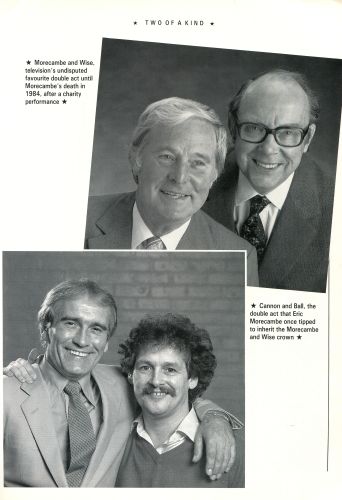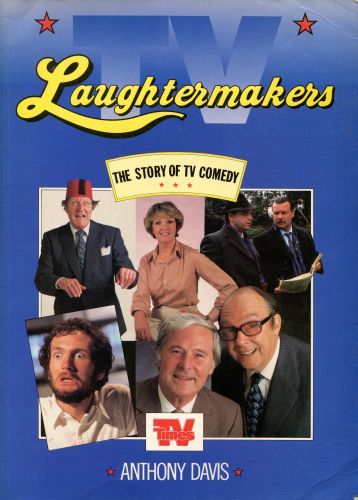
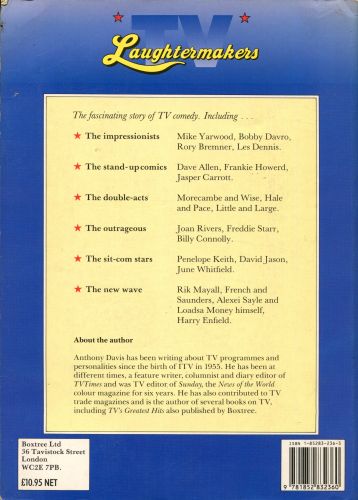
TV Laughtermakers by Anthony Davis, published 1989. Includes profiles of many TV comedians.
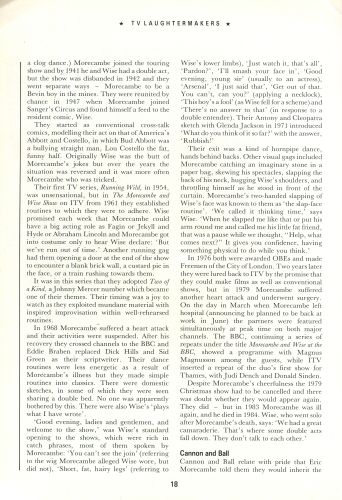
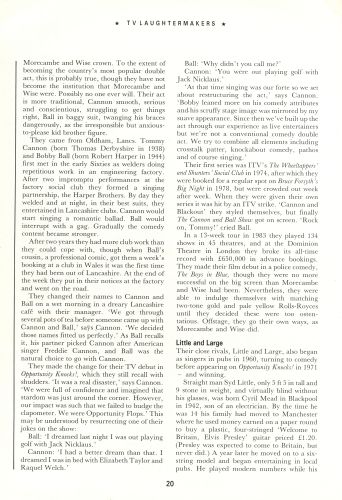
Cannon and Ball
Cannon and Ball relate with pride that Eric Morecambe told them they would inherit the Morecambe and Wise crown. To the extent of becoming the country’s most popular double act, this is probably true, though they have not become the institution that Morecambe and Wise were. Possibly no one ever will. Their act is more traditional, Cannon smooth, serious and conscientious, struggling to get things right, Ball in baggy suit, twanging his braces dangerously, as the irresponsible but anxious- to-please kid brother figure.
They came from Oldham, Lancs. Tommy Cannon (born Thomas Derbyshire in 1938) and Bobby Ball (born Robert Harper in 1944) first met in the early Sixties as welders doing repetitious work in an engineering factory. After two impromptu performances at the factory social club they formed a singing partnership, the Harper Brothers. By day they welded and at night, in their best suits, they entertained in Lancashire clubs. Cannon would start singing a romantic ballad. Ball would interrupt with a gag. Gradually the comedy content became stronger.
After two years they had more club work than they could cope with, though when Ball’s cousin, a professional comic, got them a week’s booking at a club in Wales it was the first time they had been out of Lancashire. At the end of the week they put in their notices at the factory and went on the road.
They changed their names to Cannon and Ball on a wet morning in a dreary Lancashire cafe with their manager. ‘We got through several pots of tea before someone came up with Cannon and Ball,’ says Cannon. ‘We decided those names fitted us perfectly.’ As Ball recalls it, his partner picked Cannon after American singer Freddie Cannon, and Ball was the natural choice to go with Cannon.
They made the change for their TV debut in Opportunity Knocks!, which they still recall with shudders. ‘It was a real disaster,’ says Cannon. ‘We were full of confidence and imagined that stardom was just around the corner. However, our impact was such that we failed to budge the clapometer. We were Opportunity Flops.’ This may be understood by resurrecting one of their jokes on the show:
Ball: ‘I dreamed last night I was out playing golf with Jack Nicklaus.’
Cannon: ‘I had a better dream than that. I dreamed I was in bed with Elizabeth Taylor and Raquel Welch.’
Ball: ‘Why didn’t you call me?’
Cannon: ‘You were out playing golf with Jack Nicklaus.’
‘At that time singing was our forte so we set about restructuring the act,’ says Cannon. ‘Bobby leaned more on his comedy attributes and his scruffy stage image was mirrored by my suave appearance. Since then we’ve built up the act through our experience as live entertainers but we’re not a conventional comedy double act. We try to combine all elements including crosstalk patter, knockabout comedy, pathos and of course singing.’
Their first series was ITV’s The Wheeltappers’ and Shunters’ Social Club in 1974, after which they were booked for a regular spot on Bruce Forsyth’s Big Night in 1978, but were crowded out week after week. When they were given their own series it was hit by an ITV strike. ‘Cannon and Blackout’ they styled themselves, but finally The Cannon and Ball Show got on screen. ‘Rock on, Tommy!’ cried Ball.
In a 13-week tour in 1983 they played 134 shows in 45 theatres, and at the Dominion Theatre in London they broke its all-time record with £650,000 in advance bookings. They made their film debut in a police comedy, The Boys in Blue, though they were no more successful on the big screen than Morecambe and Wise had been. Nevertheless, they were able to indulge themselves with matching two-tone gold and pale yellow Rolls-Royces until they decided these were too ostentatious. Offstage, they go their own ways, as Morecambe and Wise did.
